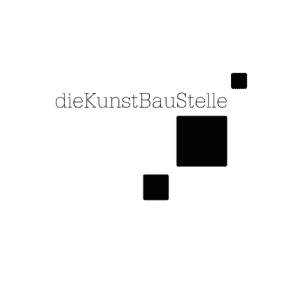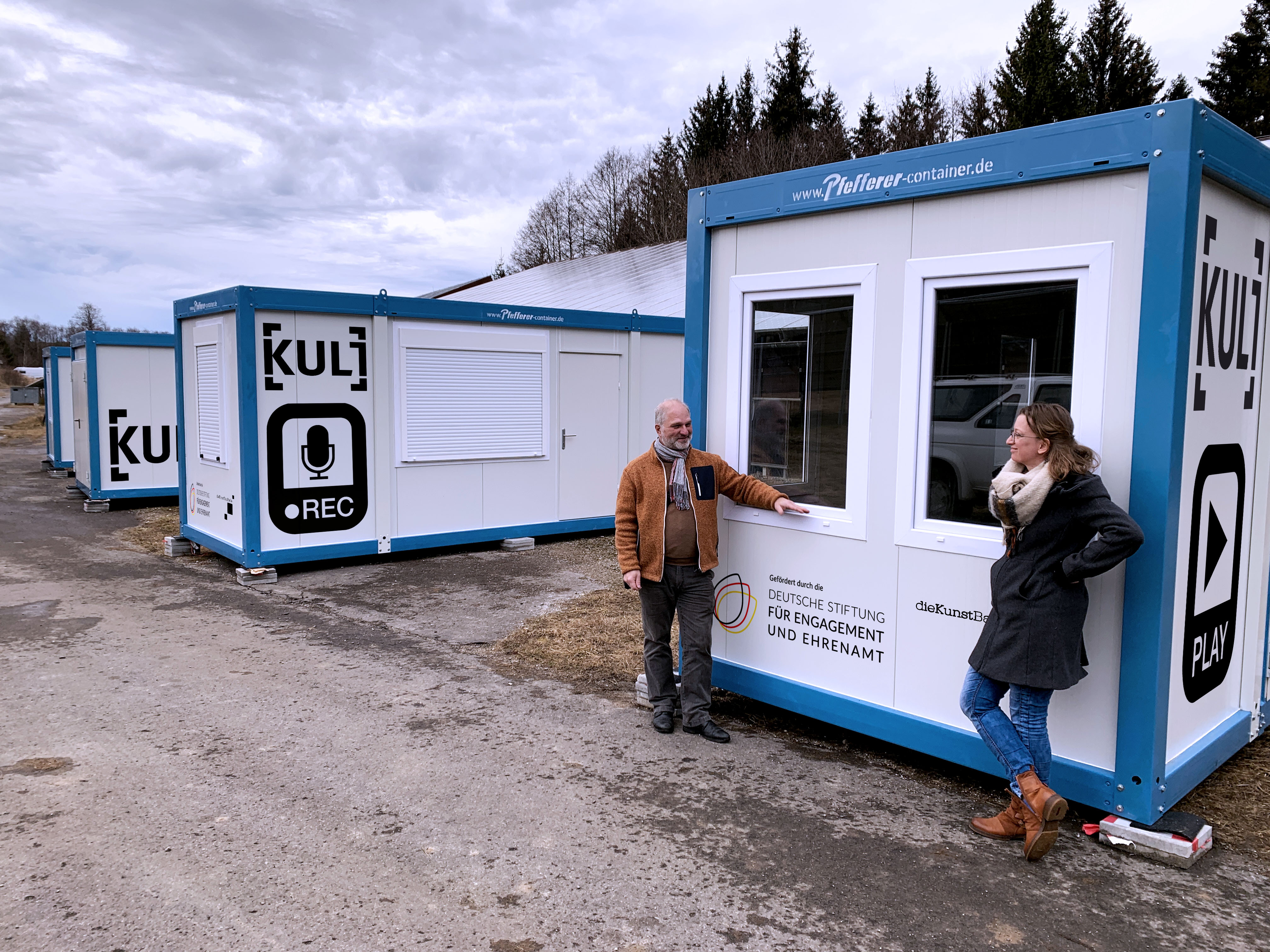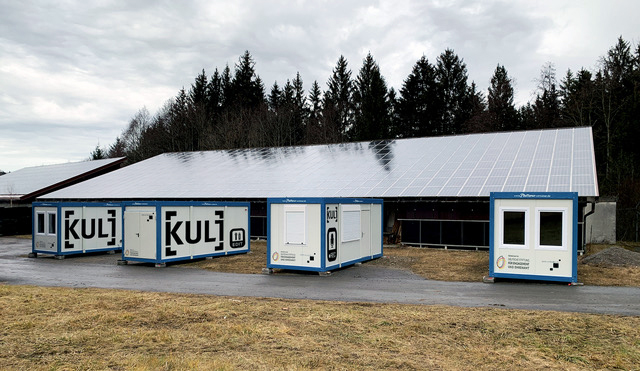Professionelle Arbeitsbedingungen – mitten im Dorf und auf dem Land
Ein Beitrag auf der Webseite von Deutsche Stiftung für Engagement und Ehrenamt.
Unser Verein heißt die „dieKunstBauStelle“ – der Name ist 2013 aus einer Initiative auf einer Baustelle mitten in Landsberg am Lech entstanden. Seit 2014 haben wir über 25 Projekte unterschiedlichster Couleur entwickelt – lokal in Landsberg aber auch international. Es gab Projekte in Flüchtlingslagern in Afghanistan und an der türkisch-syrischen Grenze. Von Anfang an binden wir dabei konsequent die unterschiedlichsten Zielgruppen ein, unter anderem Geflüchtete, Migrantinnen und Migranten und bildungsbenachteiligte Jugendliche. Darüber hinaus realisieren wir Kunst- und Geschichtsprojekte in deren Rahmen wir uns mit künstlerischen Mitteln zur Geschichte positionieren, sie erkunden, entdecken und neue Formen der Erinnerungskultur entwickeln.
Unsere Projekte werden überwiegend durch öffentliche Förderungen und Spenden finanziert. Die konkrete Umsetzung wird durch das Engagement der Ehrenamtlichen ermöglicht – das können bei kleinen Formaten fünf Personen sein, bei größeren Workshops auch mal bis zu 500 Personen.
Möglichkeiten zur Teilhabe bieten
Die Corona-Pandemie hat persönliche Kontakte und damit die direkte Arbeit in Landsberg am Lech unmöglich gemacht. Unser Glück war, dass wir schon seit vielen Jahren digitale Ausstellungen und virtuelle Räume entwickeln. In diesem Bereich sind wir durchaus Pioniere. Schon während des Lockdowns im März 2020 gab es Menschen aller Altersgruppen, die uns berichteten, dass sie mehrere Tage am Stück viele Stunden in unseren digitalen Ausstellungen und auf unseren Webseiten verbracht haben. Sie haben sowohl Verbesserungen und Korrekturen als auch viel Lob zurückgemeldet. Wir freuen uns, dass wir den Menschen zu Hause – manche von ihnen waren auch in Quarantäne – damit ein kulturelles Angebot und die Möglichkeit zur Teilhabe anbieten können.
Aber mir ist bewusst, dass wir den persönlichen Kontakt niemals gleichwertig durch virtuelle Formate ersetzen können. Deshalb bin ich sehr froh, dass wir das Projekt „Kultainer“ mit Hilfe der Deutschen Stiftung für Engagement und Ehrenamt realisieren konnten. Die Idee dahinter ist eigentlich simpel: Vier Bürocontainer, die wir als mobile Medienstudios eingerichtet haben. Entstanden sind ein Redaktionsbüro, ein Grafikstudio, ein Ton- und Radiostudio sowie ein Meetingraum. Die „Kultainer“ können mit einem LKW transportiert und an den verschiedenen Orten aufgebaut werden. Sie ermöglichen professionelle Arbeitsbedingungen – mitten im Dorf und auf dem Land. An den jeweiligen Stationen sollen sie jeweils für zwei bis drei Monate stehen und auch als kultureller und sozialer Treffpunkt wirken. Wir schaffen damit Möglichkeiten zur Mitwirkung, die es in unserer Region sonst niemals geben würde und erreichen Menschen, die ohne das Projekt nie mit derartiger Technik in Berührung kommen würden. Dabei binden wir sowohl Jugendliche als auch Seniorinnen und Senioren ein – und natürlich alle Altersgruppen dazwischen.
Erzähl Deine Geschichte
Ein redaktionelles Format unseres Angebots heißt „Erzähl deine Geschichte“. Das ist ein „Social Storytelling“, bei dem zum Beispiel eine 80-jährige Bäuerin mit einer 15-jährigen Jugendlichen diskutiert, wie sich die Sichtweisen und die Lebenswelten im Laufe der Jahrzehnte verändert haben. Ihre Dialoge sind die Grundlage für Online-Radio-Beiträge, Podcasts und Artikel, die in den lokalen Medien veröffentlich werden. Dabei ist uns ein hohes Maß an Professionalität sehr wichtig. Wir binden deshalb Journalisten, Historiker, Fotografen und Radioredakteure ein, die den Ehrenamtlichen vor Ort zur Seite stehen und ihnen die nötigen Fachkenntnisse vermitteln.
Wichtige Impulse, von denen der Landkreis noch Jahre profitieren wird
Mit den „Kultainern“ verfügt unser Verein über eine nachhaltige und multifunktionale Ausstattung. Sie ermöglichen es uns, in den nächsten Jahren flexibel, dezentral und partizipativ zu arbeiten. Ohne die Förderung durch die Deutsche Stiftung für Engagement und Ehrenamt wäre das nicht möglich gewesen, andere Fördermittelgeber fördern nur die Arbeiten in einem Projekt, zudem nur bis zu 30 Prozent der Kosten, aber keine Investitionen. Diesen wichtigen Beitrag hat das neue Förderprogramm der DSEE mit einer einfachen, wirkungsvollen und effizienten Förderung geleistet.
Durch den kurzen Zeitraum für die Umsetzung und die coronabedingten Lieferengpässe war es eine logistische Herausforderung für uns, die Medienstationen auszustatten. Anderseits war unser ganz besonders motiviert durch diese Form der Anerkennung der ehrenamtlichen Arbeit und die Tatsache, dass wir in unserem Landkreis noch Jahre davon profitieren werden. Deswegen sind die Förderung und die Impulse die damit gesetzt wurden, umso wertvoller.
Veröffentlich unter:
https://www.deutsche-stiftung-engagement-und-ehrenamt.de/



